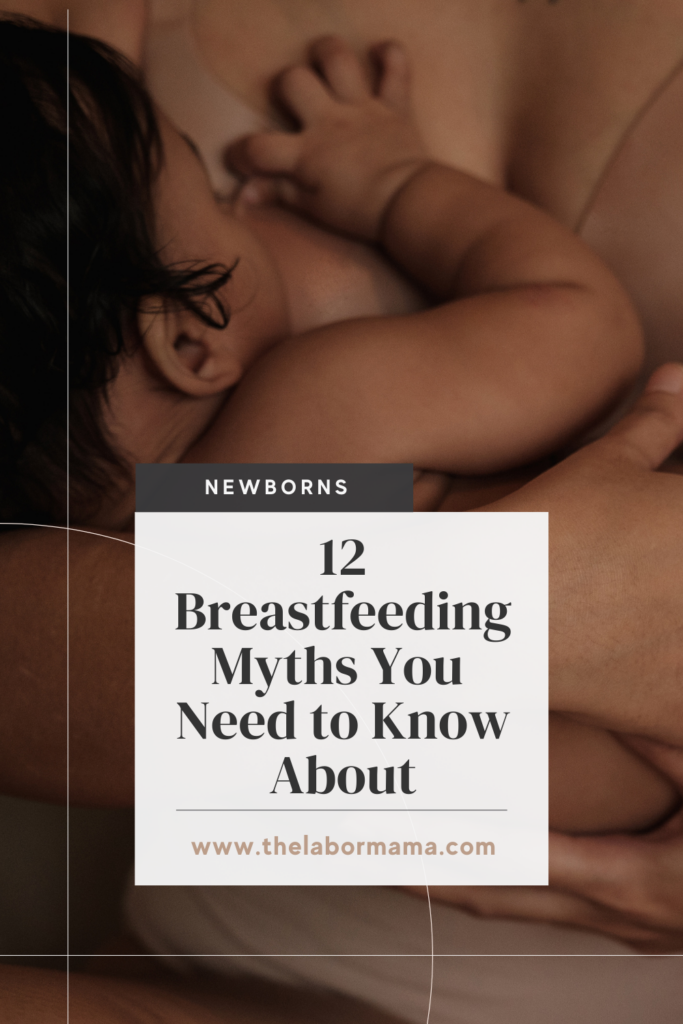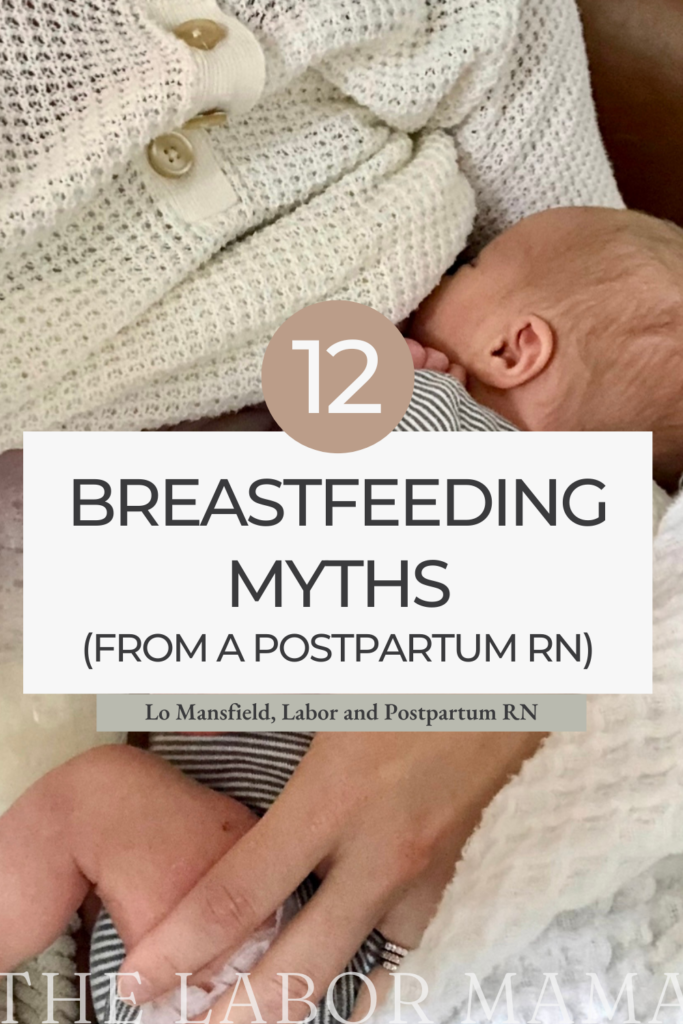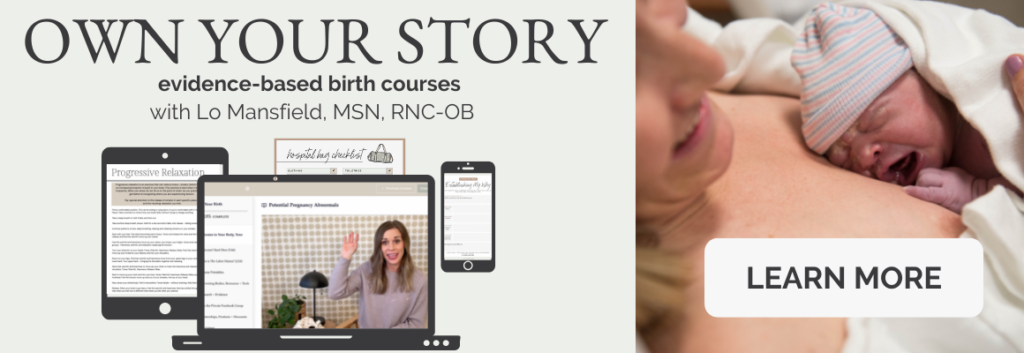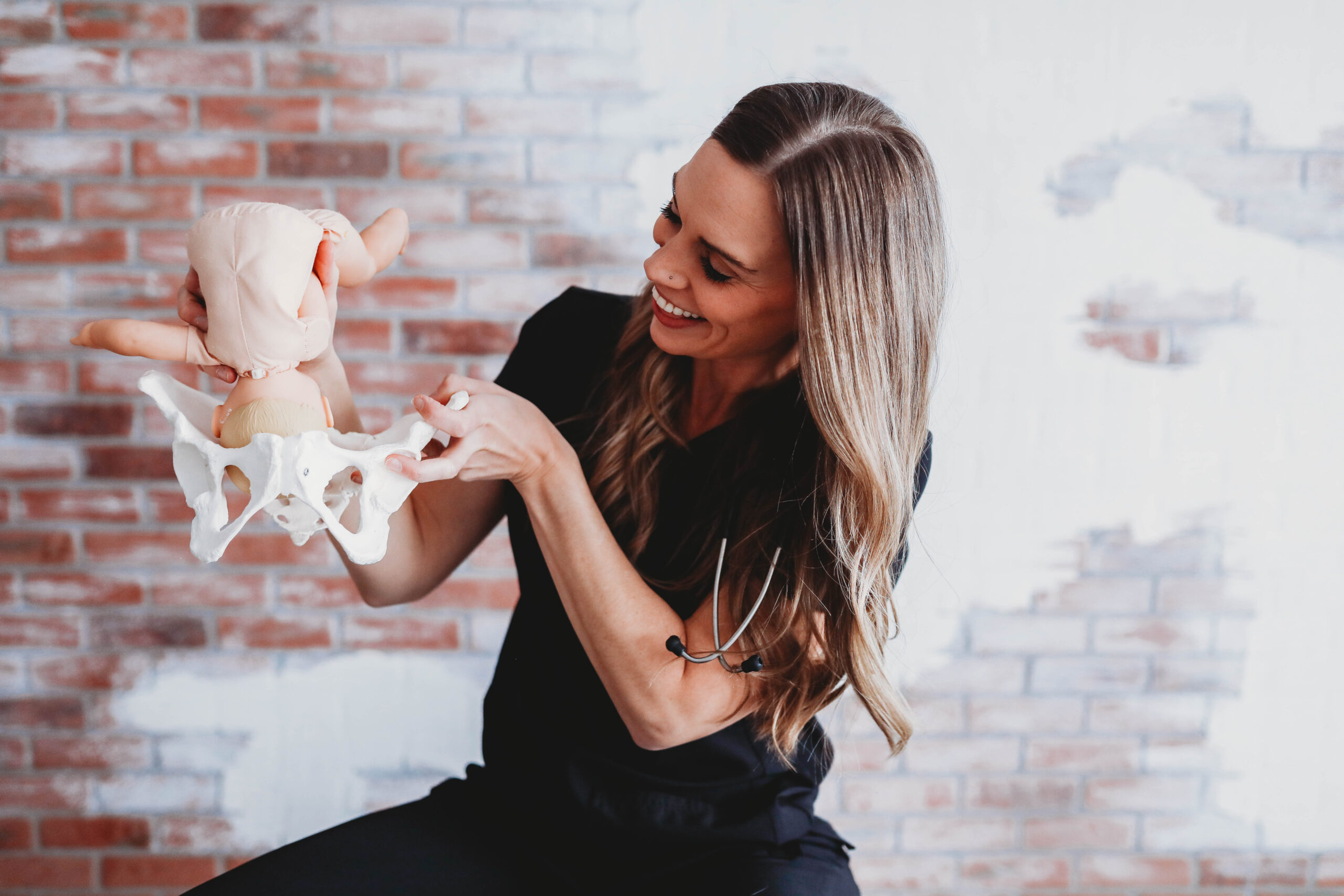The world of breastfeeding is such a tender, humbling space. I saw that tenderness and hope right away as a postpartum RN, and then I experienced it myself with the birth of my first baby. While I don’t think any two breastfeeding experiences are ever alike, I do think that one of the best things we can do to prepare for breastfeeding is to understand the truth behind the many breastfeeding myths that continue to circulate! So, let’s dig into this together. We’re going to pick apart 12 common breastfeeding myths so you can head into your own experience more informed.
12 Common Breastfeeding Myths
- You can increase your milk supply when pregnant.
- Leaky breasts equals better supply.
- Most mothers need to supplement in the first few days.
- Breastfeeding shouldn’t hurt if you’re doing it right.
- Low milk supply isn’t that common.
- You can’t breastfeed if you use formula.
- Breast size is related to output.
- You should wash your nipples before latching.
- Exercise changes the taste of your milk.
- Breastfed babies are more clingy.
- You have to stop breastfeeding if you’re pregnant.
- Breastmilk is less beneficial after a year.

Who is The Labor Mama and Why Am I Here?
Hey friend! I’m Lo – also known around here and social media as The Labor Mama. I’ve spent my nursing career in labor, delivery, and postpartum, have birthed 3 of my own babies, have labored thousands of mamas at the bedside, have taught hundreds of students online, and have even delivered a few speedy little babies with my bare hands (oops).
Here at TLM, I offer online birth classes to empower you the way everyone should be. The education + support I offer gives you experience, evidence, and empathy; you’re getting all of my years of “clinical” RN knowledge, beautifully combined with my real experiences as a mama and a nurse. These are not your hospital birth classes (those won’t do it, I promise), and honestly, birth doesn’t follow a textbook or protocol anyway – you need to know so much more than that.
If you want to connect with me further, head to Instagram. There are hundreds of thousands of us over there learning together daily.
Can you increase your milk supply when you’re pregnant?
Ever had someone tell you to start working on your milk supply when you are pregnant? Maybe they have told you to start eating certain foods or to keep checking to see if your breasts are leaking? Nope! There is nothing you can do prenatally to actually increase the supply of milk you will have.
I do believe antenatal hand expression can be really helpful in teaching you how to express milk for after baby is here (you can also collect and save any colostrum you get!), but it will not cause your body to make more milk after delivery. Lactation support before birth can be amazing too, as it will set you up so well to be supported after birth. But ultimately, your milk supply is related to Lactogenesis 3, which is the 3rd stage of milk production and it occurs after your milk has come in. What you do or don’t do prenatally cannot impact Lactogenesis 3.
Do leaky breasts equal better milk supply?
Want some honesty from me? I’ve never leaked in pregnancy or after, and I’ve been able to make enough milk to exclusively breastfeed all of my children and to build a small freezer stash. Leaky breasts are not an indication of whether or not you will make enough milk for you baby. Additionally, if you do not leak prenatally, this is not an indication that the system isn’t working or that you aren’t making colostrum.
Will I need to supplement until my milk comes in?
For the majority, supplementation (with formula or donor milk) is not needed in the first few days. After the birth of your placenta in the third stage of labor, your body will transition to Lactogenesis 2. This is the “milk coming in” process. During the “coming in” process, your baby is eating colostrum. It is low in volume, incredibly high in nutrients, and commonly called “liquid gold.” During these days, it also normal for baby to eat very often (every 2 hours or so). This frequent time on the breast helps keep their small tummy full and helps support the transition from colostrum to mature milk.
To best support Lactogenesis 2, begin expressing as soon as possible! Ideally, this can start during the Golden Hour. If you and baby are not together at this time, then begin hand expression straight away. Any colostrum you collect can be saved too!
I cover the Golden Hour and all the hours after birth extensively in Your Body, Your Birth. I’d love to have you join me inside!
Does breastfeeding hurt?
I’m going to go against the grain here and tell you about something called engorgement pain and latch-on pain. I know everyone says breastfeeding shouldn’t hurt (and technically, it shouldn’t!), but for many, these specific particulars of breastfeeding briefly do hurt! And I think you need to know what they are so you know what’s going on!
Engorgement pain: During the first couple of days, your breasts may feel swollen , tender, heavy, hard, sensitive, and warm to the touch. The pain and discomfort should be temporary as your milk comes in, but for many, it can feel very painful.
Latch-pain: This is a pain that occurs right at the moment of latch. It’s a nipple pain that lasts for about 15-30 seconds, but it does not continue through the feeds or hurt between feeds. It is also not associated with any nipple or skin damage. This pain usually peaks on day 2-3 and is gone within a couple weeks.
Is low milk supply common?
Though most bodies are able to produce enough milk for their babies, evidence does show that low milk supply is present in 10-15% of stories. In my opinion, that is definitely common enough that we need to be talking about it! There are both primary and secondary supply issues, and it is helpful to understand them. I think Kaia, at Low Supply Mom, is an amazing resource for this topic and send everyone to her if they are concerned about this area.
Can I breastfeed if I use formula?
This is another breastfeeding myth that drives me crazy! I am absolutely for the goal of exclusive breastfeeding, but we must be sure that mamas know that they can do both it that is what is good and right for them. Most babies will switch back and forth between breast and bottle just fine!
At a basic level, you do want to understand that formula = a feed. So if you want your body to continue to produce the amount of milk your baby needs, you will want to pump during the time they get a bottle. If you are using formula to replace a feed (meaning you no longer want your body to make that breastmilk), then you would not need to pump to “replace.”
Do larger breasts mean better milk supply?
No. There is ZERO relationship here. I’m proof of that, if you want it. 🙂

Should I wash my nipples before latching?
You do not need to wash your nipples off before you latch or express. Have you ever noticed the small bumps on your areola? Those are called Montgomery glands and they produce a natural oil that cleans, lubricates, and protects your nipples. The oil also has an enzyme that actually combats bacteria and makes you smell like you (familiar to your baby). You definitely don’t want to wash all of this good stuff off.
Does exercise change the taste of breastmilk?
This is another pervasive breastfeeding myth, isn’t it? Exercise does not change the taste or composition of your milk. Light to moderate exercise is actually really beneficial to your health and wholeness and breastfeeding should not be a reason not to exercise!
Are breastfed babies more clingy?
Every baby is so unique; this is just silly! Breastfeeding can enhance bonding, but it is not the only way to bond, nor does it determine the attachment you will have. Beautiful bonds exist between all mamas and all babies, breastfed or otherwise. And in general, “clinginess” is based on temperament, regardless of how a child is fed. Personally? None of my babies was/is clingy, and they’ve all been breastfed.
Do I have to stop breastfeeding if I’m pregnant?
You probably do not! Research shows that barring some really specific situations, it is perfectly safe to breastfeed while you are pregnant. Breastfeeding in pregnancy has not been shown to cause preterm labor, impact the size of the developing baby, or cause harm to the pregnancy. If your pregnancy is high-risk, then please discuss with your provider specific considerations for you.
Being pregnant can change your supply or your breastmilk’s flavor. The hormones of pregnancy can also cause maternal aversions to wanting to breastfeed that older babe! None of these are reasons to not do it, but it’s good to know what might come up!
Is breastmilk still beneficial after a year?
Yes. Breastmilk is always beneficial. Without question, it can benefit their nutrition, health, intellectual, social, and mental development, and it can benefit you! There are many pieces of evidence to support the benefits in all of these areas; this Fact Sheet from Kelly Mom on the topic is great. It is absolutely a breastfeeding myth that breastmilk becomes less valuable after the first year.
The takeaway on common breastfeeding myths
The idea that breastfeeding is natural can cause you to believe that it just works and makes sense, but I think you will find that there is actually so much more nuance here. It is so important for you to learn what is fact and what is fiction about breastfeeding, because this will be the information that you use to make choices about what is right and what matters for you and your baby!
I hope the deconstruction of some of these myths helps you sort out some of what is and isn’t true. If you know of other myths, drop them in the comments! I’d love to know what else is out there for you. xx – Lo

More resources (and freebies!) for you to take a peek at:
- Comprehensive Birth Plan and Birth Priorities templates
- A complete Third Trimester Checklist
- The RN + mama of 3 Ultimate Packing List
- The Labor Mama online birthing classes for every family
A note: This post may include affiliate links. This means if you make a purchase after clicking a link, I will earn a small commission (thank you)! Rest assured, this comes at no additional cost to you. You can read TLM’s full disclosure here.




